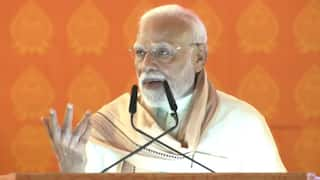World Heart Day 2022: Excessive Exercise Is Not Good For Our Bodies, Brings A Heavy Load On Heart
World Heart Day 2022: People who look completely healthy may be vulnerable to heart attacks and suffer from cardiovascular disease. Excessive exercise can lead to heart attacks, according to experts.

World Heart Day falls on Thursday, September 29. The event comes at a time when the number of heart attacks remains high, and days after the death of the comedian Raju Srivastava, who suffered while exercising. Excessive exercise can lead to heart attacks, according to experts. People who look completely healthy, too, may be vulnerable to heart attacks and suffer from cardiovascular disease.
The right amount of exercise
“Excessive exercise is certainly not good for our bodies by any means. Excessive exercise or HIIT (High-Intensity Interval Training) should only be reserved for professional athletes. (Even for them, it is not cardio-friendly),” Dr Bikram Kesharee Mohanty, Senior Consultant Cardio-Throacic & Vascular Surgeon (Adult & Paediatric) and Visiting Consultant at National Heart Institute, New Delhi, told ABP Live.
Dr Sushant Srivastava, Chairperson Heart & Lungs Transplant, Cardio Thoracic and Vascular Surgery, at Artemis Hospital, Gurgaon, described excessive exercise as “exercise someone is not accustomed to”.
“It can happen in several situations. Sometimes people set unrealistic targets for themselves under pressure. For example, a young person is due to be married, and is in a hurry to get in shape or a screen personality wants to shape up over a few weeks; they are likely to overexert. Because of busy schedules, people miss exercising for long periods and then try to make up over a short period by over-exerting. Exercise should be increased gradually and rest in between is very important,” Dr Srivatsava said.
While it is necessary to exercise to a moderate extent in order to keep fit, one should know when the exercising becomes excessive. Dr Mohanty explained where to draw the line.
“Calculating how much one should do varies according to the individual's age and medical conditions. Here comes the role of MHR (Maximum Heart Rate) & THR (Target Heart Rate). To keep ourselves physically fit, our THR should be 60%-80% of our MHR. The formula for MHR = 220 - Age (beats per minute). To simplify, if the person's age is 40 years, then the MHR = 220 - 40 = 180 beats per minute. So, the THR (which is 60%-80% of MHR) should be 108 to 144 beats per minute. So, that individual should not exceed his heart rate beyond 108 to 144 by any means while exercising. If a person is a smoker or has other medical conditions, they should achieve a THR of 50% of the MHR,” Dr Mohanty said.
Excessive exercise brings a heavy load on the heart. “Thereby the heart undergoes remodeling. The walls become thicker, which is medically not a good condition. These hearts, known as ‘athletes' hearts’, are more prone to heart diseases, cardiac arrest, and even stroke,” Dr Mohanty said.
Dr Srivastava said a high metabolic demand on the heart leads to the release of high levels of stress hormones. “The blood pressure shoots up and soft plaques causing mild blockages can rupture causing clots to form, cutting off the blood supply of the heart muscle leading to heart attacks,” he said.
Even people who look healthy may be vulnerable
Dr Mohanty attributed the high number of heart attacks to "new-age lifestyle and problems”. He said, “Unhealthy dietary habits, a sedentary lifestyle, lack of physical activity, excessive caffeine in drinks such as tea and coffee, smoking, excessive alcohol intake, and a stressful lifestyle are responsible for this rise.”
Dr Srivastava added: “People are always on the run, grab fast food, smoke, do not sleep enough and regular exercise is missing from their lives. As a result, high blood pressure, diabetes and heart disease are on the increase.”
People who look completely healthy, too, may have cardiovascular disease. “If at all they look healthy, one may not be healthy from the inside. So beyond the age of 40, one should undergo yearly heart checkups. Suppose the person has high-risk factors, namely high blood pressure, diabetes, chronic smoking, excessive alcohol intake, physical inactivity, high cholesterol levels, family history of heart disease, and symptoms of heart disease like chest pain, breathlessness, and forceful heartbeats. In that case, the person should undergo cardiac checkups even earlier,” Dr Mohanty said. He said professional athletes are more prone to cardiac arrests.
Someone who has had a heart attack may look healthy, it does not mean they are really healthy. Dr Srivastava said it is rare for completely normal people to have heart attacks. “Most apparently healthy people who have heart attacks have mild asymptomatic disease and under stressful conditions, and a plaque or a soft blockages ruptures causing a heart attack,” he said.
Misconceptions about heart illness
For many people, a misconception is that “I cannot have heart disease”. “People think that they are physically fit, hence they cannot have a heart attack. So they never undergo cardiac checkups. They believe that not being overweight and going for regular work to their workplaces (though they don't do regular exercises) would qualify them for not having heart ailments. Many people have chronic stress, thereby having frequent surges of the release of stress enzymes inside their bodies which damage the heart arteries and can give rise to blockages and then heart attacks. It is also hereditary and can happen without any risk factors and without any warning signs,” Dr Mohanty said.
Dr Srivastava, too, cited a number of misconceptions about heart disease, such as “heart disease occurs only in the elderly”; “coronary heart disease does not affect women”; “if someone is asymptomatic, he cannot have high blood pressure or diabetes”; and “discomfort in the chest or upper abdomen on walking or climbing stairs is always ‘gas’.”
Significance of World Heart Day
World Heart Day is an initiative by the World Heart Federation (WHF) to spread awareness about cardiovascular disease (CVD), including heart disease and stroke.
The World Heart Federation, in collaboration with the World Health Organization (WHO), announced the establishment of World Heart Day in 1999. Until 2011, World Heart Day was observed on the last Sunday of September. Now, it is observed on September 29 every year.
Cardiovascular disease, including heart disease and stroke, is the world's leading cause of death, with 18.6 million people dying each year due to these diseases. World Heart Day is the world's biggest awareness raising platform for CVD, and for the CVD community to come together in the fight against this disease, and reduce its global burden.
Check out below Health Tools-
Calculate Your Body Mass Index ( BMI )
Top Headlines






































